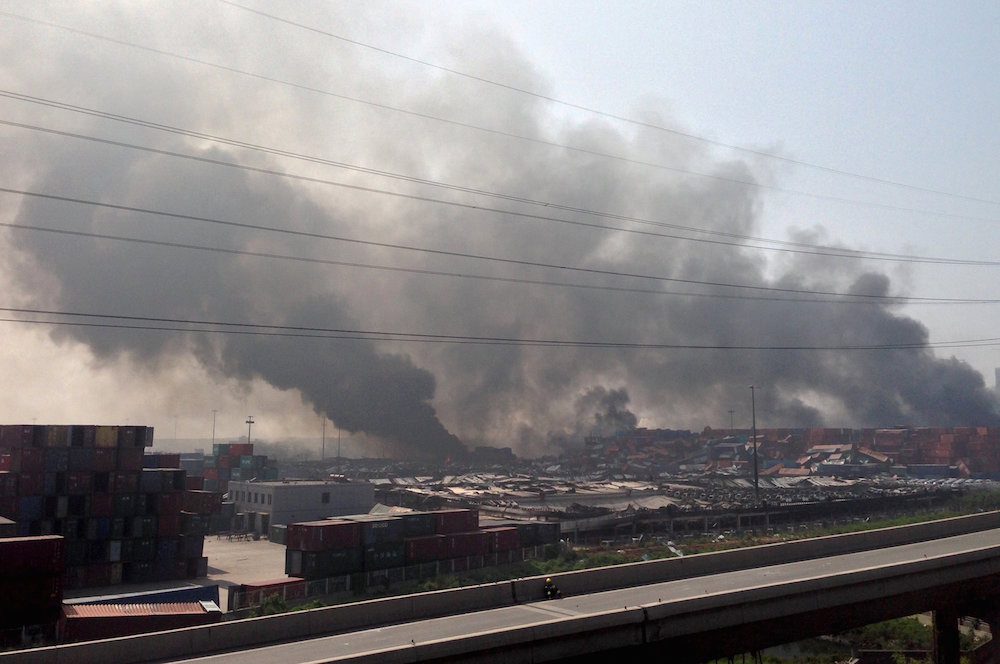Tianjin Blasts Barely a Blip for Marine Insurance Prices
LONDON/FRANKFURT, Jan 7 (Reuters) – Reinsurance rates in the marine sector continued to fall at the start of the year, in spite of the huge cost of explosions at China’s...

Smoke rises over the site of the explosions at the Binhai new district in Tianjin August 13, 2015. REUTERS/Jason Lee
By Bloomberg News
(Bloomberg) — Shipments of oil and iron ore were disrupted at the northern Chinese port of Tianjin after a blast killed at least 44 people and injured hundreds.
Oil tankers and vessels carrying “hazardous products” are barred from calling at the port after multiple explosions rocked the city on Wednesday, according to a post from the official microblog of the Tianjin Maritime Safety Administration at 11:22 a.m. local time Thursday. BHP Billiton Ltd. and Rio Tinto Group said iron ore shipments were disrupted, while another vessel was prevented from loading steel.
[contextly_sidebar id=”y5bul9vWRQr4tVSZqhKOnfq0LhxTvWqi”]Tianjin is the 10th-busiest container port globally and has become a northern gateway for shipments of ore, coal, automobiles and oil into China, the world’s biggest user of energy, metals and grains. About 17 percent of the nation’s ethylene imports, 15 percent of its wheat deliveries and 30 percent of steel exports in the first half of 2015 were transported via the Tianjin customs area, government data show.
“The blast will have some direct impact to port operators and commodities importers and exporters in the near term,” said Helen Lau, an analyst at Argonaut Securities (Asia) Ltd. in Hong Kong. “It will have little impact to commodities prices and imports as other ports across China’s eastern coastline, especially those ports in nearby Shandong and Hebei provinces, could easily digest the capacity Tianjin may not be able to handle.”
BHP Shipments
Total throughput at Tianjin rose 10 percent in 2014 to 445.8 million metric tons, according to Hong Kong-listed Tianjin Port Development Holdings Ltd. It handled 110.5 million tons of metal ore, 88.9 million tons of coal and 18.7 million tons of crude oil, the equivalent of 375,000 barrels a day. China National Offshore Oil Corp.’s Tianjin FLNG, the nation’s first floating liquefied natural gas terminal, is nearby.
BHP Billiton, the world’s biggest miner, is working with customers to minimize the potential impact from the disruptions to its iron ore shipments, the company said in an e-mailed statement. There was no damage to its discharging berths at the port, it said.
Rio Tinto said its five vessels anchored in the harbor were unaffected by the blast. The company said five fully-laden bulk carriers are being re-routed, without specifying where to or what would happen to future shipments.
Material damage to the port could result in meaningful short-term disruptions to iron ore deliveries as well as lost or damaged stockpiles, according to Clarksons Platou Securities, an investment bank that focuses on the energy, shipping and oil- service industries.
Chinese Refineries
China Petroleum & Chemical Corp.’s Tianjin and Yanshan refineries may be affected if the outage lasts, according to Amy Sun, an analyst with Shanghai-based commodities researcher ICIS China.
A spokesman for the company, known as Sinopec, said its refinery near Tianjin was operating normally and that it didn’t see any immediate impact to plant logistics. The refinery has capacity of 251,000 barrels a day, according to data compiled by Bloomberg.
The port area is also home to manufacturing facilities, including construction-equipment makers Deere & Co. and Caterpillar Inc. Deere’s east campus at Tianjin had broken windows, according to an e-mail from spokesman Ken Golden. Lisa Miller, a Caterpillar spokeswoman in Peoria, Illinois, said the company had no updates on the situation in Tianjin.
Operations at PetroChina Co.’s Dagang refinery that’s in the southern part of Tianjin municipality aren’t affected, according to a spokesman. He declined to comment further.
The late-night blasts Wednesday, which may have been the result of a fire, spewed toxic material into the air and shattered windows in buildings for kilometers around. China’s earthquake center said the biggest explosion was equivalent to a 2.9-magnitude temblor.
–With assistance from Jing Yang in Shanghai, Moming Zhou in New York, Brett Foley in Melbourne and Thomas Biesheuvel and Manisha Jha in London.
©2015 Bloomberg News
This article contains reporting from Bloomberg, published under license.

Sign up for gCaptain’s newsletter and never miss an update

Subscribe to gCaptain Daily and stay informed with the latest global maritime and offshore news
Essential news coupled with the finest maritime content sourced from across the globe.
Sign Up